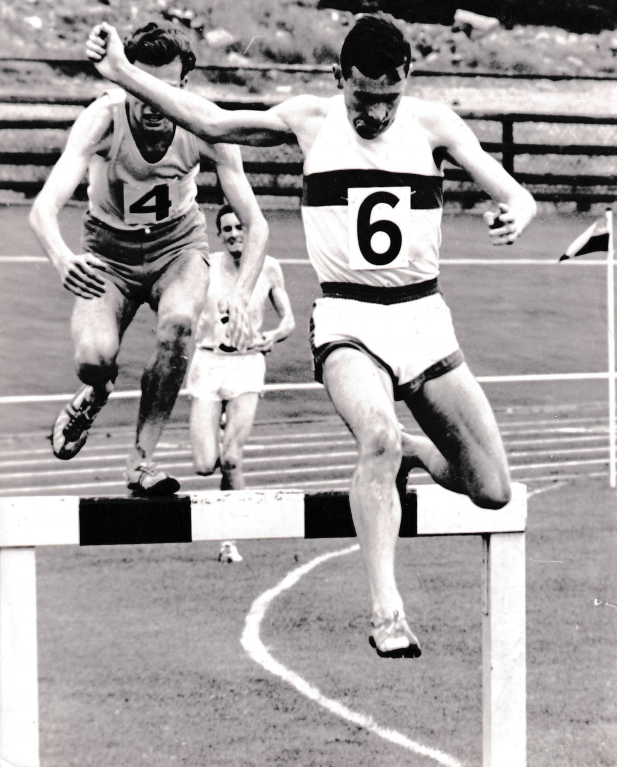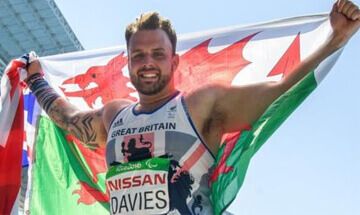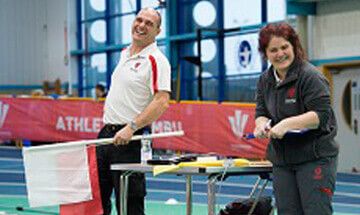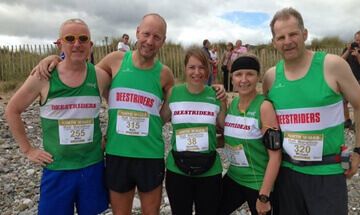
Cymryd Rhan
Hedydd Davies
In July 1952 I was listening on the wireless to Alun Williams’s commentary on the 1952 Olympic Games marathon in Helsinki.
‘And into the stadium comes a balding figure in a red vest with number 903 on the front. It is the great Czech runner Emil Zatopek who is running his first ever marathon. He wins in 2 hour 23 minutes and 3 seconds. He had already in the Games won gold medals in 10000m and 5000m. His wife Dana also won a gold medal in the javelin’
Emil was my idol and inspiration to run a marathon. At about the age of 16 I decided to run a marathon from my home on a farm in Abergwili Road Carmarthen to Llandeilo and back. My younger brother paced me on his bike. On the way back I came to a stop at 19 miles in Nantgaredig and had to walk home
In my six years at Birmingham University I did very many races on the track, cross country and road but concentrated on the steeplechase winning 2 BUCS titles and 4 Welsh titles (1961-64). I was still keen on running a marathon and in 1964 finished second in the Pembroke 20 mile race (at 15 miles led the great Ron Hill who later set a European Record for the marathon in 1970 with a time of 2 hours 9 minutes and 28 seconds).
My first real attempt at the marathon was the Welsh marathon in Port Talbot in 1966 which I won. This was the first of probably be about 40+ marathon or longer races in my athletics career.
I won the Welsh marathon title on 3 more occasions (1969, 1970 and 1972, second once and third twice). I competed for Wales in the 1970 Commonwealth Games marathon in Edinburgh (won by Ron Hill) and finished third in the Cardiff Marathon in 1981. I continued to compete for Wales many times in the marathon and the last time was the Glasgow international marathon in 1982.
Emil Zatopek won 4 Olympic gold medals (10,000 gold and 5000m silver in London 1948) and a sixth place in the Melbourne Olympic Games marathon in 1956. He gave one of his gold medals to the great Australian athlete Ron Clarke who had set 18 world records but failed to win an Olympic gold medal Tokyo 1964 and Mexico City in 1968.
I had the pleasure of competing in the 1965 AAA 3000m steeplechase in the White City Stadium London which was followed immediately after by Ron Clarke’s great 3 mile record race time of 12 minutes 50.4 seconds.
Emil Zatopek came to Copthall Stadium Hendon London in 1968 to give a talk to coaches and athletes. What a humble person who was able to speak eight languages. Sadly, Emil suffered enormously in his later life from the political system at the time in Czechoslovakia. He was a man of high principles. In recent years I have been to the Czech Republic many years and seen the change since the end of communism in the country (so different to the time when I was there in 1971).
1964 my best year in Athletics
At the beginning of the year, I set the following targets.
- lmprove on my personal best time of 9.12.6 for the 3000m steeplechase event
- Try to break the Welsh championship 3000m steeplechase record of 9.19'4
- Win the British Universities and English Universities 3000m championships steeplechase titles
- Try to gain selection for the 1964 Tokyo Olympic Games in the 3000m steeplechase
For three years from 1961 onwards I shared a flat in Northfields South Birmingham with Mike Ripley. He was doing a Ph.D. in Geology and spent a lot of his time doing research work in Cornwall. He said to me you will never make a top class steeplechaser. Your style of running is so inefficient, and you are so slow as your best 880 yards time is only 2.02 and you have not got a sprint at the end of the race. I said to him I know you are a mad keen and a very good footballer. How about you trying the 440 yards? Right then we will have a bet. Your target is under 50 seconds for 440 yards and my target is under 9 minutes for the 3000m steeplechase. OK then, that is a deal. So, Mike turned up at the Birmingham University track in his baggy football shorts. He was a tall gangling lad. He did show some talent for running and soon attracted the attention of Dr Mike Hayes the University coach. Dr Hayes was a lecturer in the Chemistry Department and a product of the Cornell University coaching system in America.
I had a very good spring season at cross country running and road running relays with Birchfield Harriers. Well placed in all the Birmingham Cross country League races 7th in the Midlands senior cross country championships. 32nd in the English cross country championships. 2nd in the Welsh senior cross country championships at Penlan Swansea. lt had been a very close race and I only lost by one second to Tom Edmunds but was 75 seconds ahead of the third placer Tony Harris of Mitcham who was a four minute miler. I competed for Wales in the ICCU world cross country championships in Dublin and the Martini Cross Country international in Brussels Belgium. I had very good runs in all the road relay races including the Midlands and National road relay championships.
Every lunchtime at 12 noon without fail my squad of 6-8 students would train with me on the Birmingham University track or the University playing fields for a maximum period of 35 minutes. lt was very hard work in a short period of time. I also every day ran 3 miles in the morning from the flat to the University Gym. and ran back home in the evening. I was also finalizing my work for my PhD which required the production of a substantial thesis.
AAA versus Oxford University in May 1964
I was selected to compete for the AAA in this annual match. lt was a great honour to be chosen to compete for the AAA with Ernie Pomfret a well-established GB international in the 3000m steeplechase. To run on the Oxford lffley Road track was a great honour and almost to the day ten years since Sir Roger Bannister had run a mile in 3 minutes 59.4 seconds. The first time that the mile had been run under 4 minutes.
Ernie Pomfret helped me in the race, and we alternated the lead, each one of us taking a lap at a time. Result 1st Ernie Pomfret AAA 8.58.2; 2nd Hedydd Davies AAA 9.00.0
My flat mate Mike Ripley could not believe the result. He thought the timekeepers must have been blind and deaf. Still, I had not yet met my target. So, the bet was still on.
British Universities and English Universities Championships
The British Universities championships were held in Liverpool that year. The 3000m steeplechase event was held on the Friday evening which lwon with a time of 9.11.0. l also ran in the 3 mile event on the Saturday and came 6th with a time of 14.20.The English University Championships were held on my home track at Birmingham. lt was a one day event.
When I was the Birmingham University athletics captain in 1961, I had the steeplechase water jump re built with a new wooden floor and matting. The start of each race was changed to start at the end of the finishing straight rather than the middle. My flat mate Mike ran in the 440 yards and he came third with a time of 49.8 seconds. So, I had lost half of my bet and owed him £10. A lot of money in those student days.
Next up was 3000m steeplechase event with my full training squad of eight members cheering me on. Yes, I had a go and finished first with a time of 9.01.1. So near but so far. Mike my flat mate was so pleased. His money was safe.
Like a true team member, l then ran in the 3 miles and finished third to John Whetton of Loughborough Colleges. John was a seasoned GB international with a fantastic sprint which I never had. Most of my track races were a full out sprint from start to finish. At 5pm that afternoon my training squad dragged me down to the University training fields where they hammered me over a session of 6 x 1050 yards with 45 seconds recovery time. What a day?
AAA versus Loughborough Colleges in June 1964
I had been selected to run with Maurice Herriott again for the AAA in the 2000m steeplechase event. It was a great honour to be selected to run with Maurice. He had won the AAA steeplechase several times and was to win a silver medal in the event in October in the 1964 Olympic Games in Tokyo Japan. He had a terrific finish and was unbeatable in this country.
We agreed to share the lead over the five lap event and on the last lap he left me for dead. 1st Maurice Herriott AAA 5.39.6; 2nd Hedydd Davies AAA 5.43.6
It was then announced that both competitors had broken the existing poor world record. However, the track was re checked and found that the race had started from the wrong point. lt was 23 yards short.
Welsh Championships in Cardiff in June 1964
I had won the event in the three years preceding with times of 1961 -9.31,.1962 - 9.31.2; and 1963 - 9.32.4 and the Welsh championship record was 9.19.4.
The championships were held at Maindy Stadium Cardiff on the old cinder track which had been transferred from the 1958 British Empire and Commonwealth Games track at Cardiff Arms Track. The track at Maindy was peculiar in that the run up to the water jump was on grass.
I gave it my all and won my fourth consecutive welsh steeplechase title. Result 1st Hedydd Davies 9.05.3; 2nd Billstitfall 9.25.7; 3rd Brian Griffiths 9.30.6
A new Welsh championship by 14 seconds.
I thought I had a good chance of winning the trophy for the best performance of the championships. However, it was not to be, and it went to a pole vaulter. Midland Counties versus Southern counties versus Northern Counties at Aldersley Stadium Wolverhampton. A Welsh speaking Welshman running for the Midland Counties?
I had already competed for the Midland Counties in a cross country match and had been living for most part of six years in Birmingham. So, what!
I was chosen to compete once again with Maurice Harriott in the 3000m steeplechase. It was a cracking race from the start and there was three of us together with two laps to go. Maurice Herriott then took it up and won easily. I battled all the way with John May of Mitcham AC who was representing the Southern Counties. See photograph below which shows both of us taking the final water jump.
May passed me in the last 100m and I finished 0.2 seconds behind him. 1st Maurice Harriott Midland Counties 8.43.6; 2nd John MaySouthern Counties 8.54.4; 3rd Hedydd Davies 8.54.6
My time was the second fastest time ever by a Welshman then. The Welsh record was held by John Disley who had ran 8.51.6 when he won the bronze medal in the 1952 Olympic Games 3000m steeplechase in Helsinki Finland. So, I had broken the 9 minute barrier at last. I said to Mike Ripley my flat mate that evening you owe £10 which he was glad to hand over. Next day I travelled by train to Carmarthen as I was due to have a filming session at home on the farm the following day. On the Monday Ken Davies, the BBC photographer turned up and had me prancing about in the hayfield on the family farm.
AAA Championships at the White City London in July 1964
The White City was the mecca of athletics then. The track was inside a greyhound track and you had to enter the athletics track by means of an underground tunnel. There had been many great athletics events in the White City. I remember in 1955 watching on a friend's small television set the exciting 5000m race between Chris Chataway and the Russian Vladimir Kuts when Chris set a new world record. Ron Clarke in 1966 set a new world record for the 3 miles at the White City with a time of 12.50.4, the first time 3 miles had been run under 13 minutes. I had run in the 3000m steeplechase event just before. lt being a cindertrack it was not in a perfect condition unlike the modern synthetic tracks.
In the 1964 AAA 3000m steeplechase championship event I decided to give it a real go from the start and had a 5m lead after 3 laps (see photograph of the race). However, tiredness crept in and lwas hauled in and finished in 6th place in a time of 9.03. ln 1964 my average time for 10 steeplechases was 9.03 and I had many invitations to compete in steeplechase events all over the country.
ln August I had finished my 250 page Ph.D. thesis and it was submitted to the University. I then decided to have a short break walking in the mountains in Scotland. When I came back on the Thursday afternoon there was a letter waiting for me inviting me to compete on the Saturday in the final Olympic Trials in Portsmouth
Final Olympic Trials in Portsmouth in September 1964
Off I went and, on the day, ran well to finish second to Ernie Pomfret in a slow time of 9.11. The GB qualifying time in the 3000m steeplechase for selection for Tokyo was 8.46. Only two athletes in Britain that year had gone under 8.46 and they were my close friends Maurice Herriott and Ernie Pomfret. So, they were the only two to be selected. Maurice ln Tokyo won a silver medal which was a tremendous achievement.
ln Tokyo Welshman Lynn Davies on a horribly wet and windy day won the long jump with a leap of 8.07m Lynn had competed on several occasions on the old cinder track at Ystrad Tywi School in Johnstown Carmarthen. ln fact, he had broken the UK long jump record in Carmarthen. However, this achievement was not ratified as the long jump run way was found to be slightly downhill.
ln October 1964, I started on my Dip.Ed. course at Oxford University. An exceptionally fine university and the opportunity to train every day if I wanted to on the world famous lffley Road cinder track.
Later, in early November I had to return to Birmingham University to have my viva examination. It seemed to have gone OK and at the end of November 1964 I was informed by letter that I would receive my Ph. D at the degree ceremony in the Birmingham University Great Hall in December 1964. My flat mate Mike Ripley would also receive his Ph.D. at the same time. I invited my mother and aunt to be my guests at the Degree ceremony. My mother had almost single handedly kept the 53 acre family dairy farm going since the sudden death of my father on 14th June 1955. They both could not drive and had never ever been before to a big city like Birmingham. I put them up in a very good hotel on the Hagley Road and showed them the good sights of Birmingham. They marveled at the size of the John Lewis store and were not very happy going up and down the escalator there. The degree ceremony was quite an experience for them. I remembered very well my mother saying to me on the day my father died did I want to go to college?
Yes, I did go to college and I know how much she sacrificed to get me and my younger brother there and to support me during my seven years of university education. My mother had a new house built on part of our farm's field and she sold the farm in 1965 to Allan Davies, whose brother Russell was a very good sprinter with Carmarthen Harriers and the father Glyn was a founder member of the club. Our farm was called Glasdir, and Allan renamed it Green Meadows. She moved into her new house late on in 1965 but was only there for a short while before she died on 17 September 1966.
Yes 1964 was a very good year. I achieved most of my targets.
Hedydd is one of Welsh Athletics Life Members this is limited to ten members. The most prestigious award to be bestowed on a member of Welsh Athletics – the award recognises long, exceptional and distinguished service to the Sport of Athletics in Wales.
Hedydd was awarded Lifetime Achievement award by Welsh Athletics in 2012.
The Lifetime Achievement Award is for someone who has made a significant and major contribution to athletics in Wales during his or her lifetime, with a minimum of 40 years’ service to the sport.
Dolenni diddorol
Tudalennau yn yr adran hon a allai fod o ddiddordeb.



